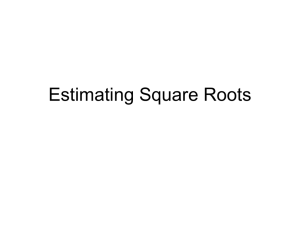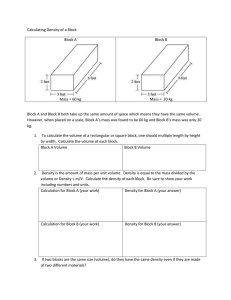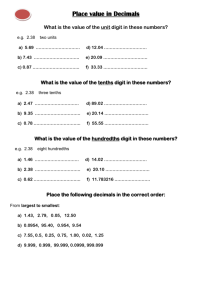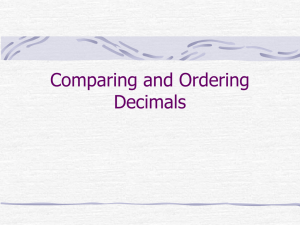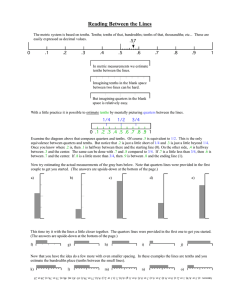Medication Calculations Tips, Abbreviations, Conversions
advertisement
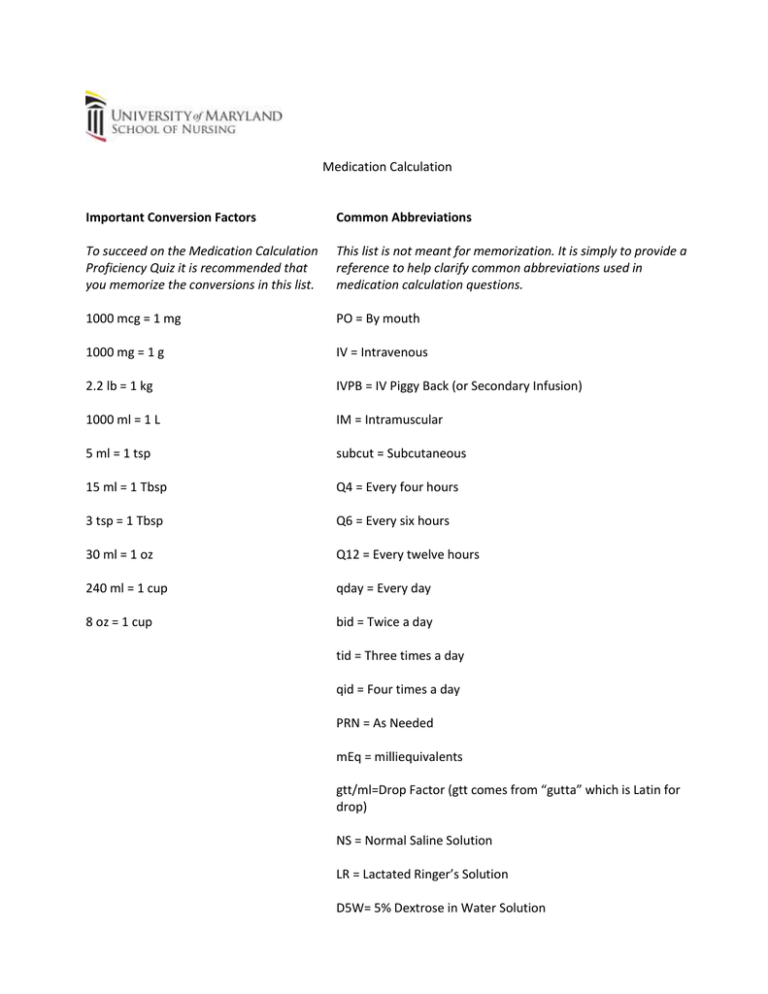
Medication Calculation Important Conversion Factors Common Abbreviations To succeed on the Medication Calculation Proficiency Quiz it is recommended that you memorize the conversions in this list. This list is not meant for memorization. It is simply to provide a reference to help clarify common abbreviations used in medication calculation questions. 1000 mcg = 1 mg PO = By mouth 1000 mg = 1 g IV = Intravenous 2.2 lb = 1 kg IVPB = IV Piggy Back (or Secondary Infusion) 1000 ml = 1 L IM = Intramuscular 5 ml = 1 tsp subcut = Subcutaneous 15 ml = 1 Tbsp Q4 = Every four hours 3 tsp = 1 Tbsp Q6 = Every six hours 30 ml = 1 oz Q12 = Every twelve hours 240 ml = 1 cup qday = Every day 8 oz = 1 cup bid = Twice a day tid = Three times a day qid = Four times a day PRN = As Needed mEq = milliequivalents gtt/ml=Drop Factor (gtt comes from “gutta” which is Latin for drop) NS = Normal Saline Solution LR = Lactated Ringer’s Solution D5W= 5% Dextrose in Water Solution Medication Calculation Tip Sheet Dimensional analysis is the format taught to solve problems. Refer to your Ogden/Fluharty text, Chapter 12, page 171 for review of dimensional analysis. o If another format for solving works better for you, stick to what works best. Identify what the question is asking you for before setting up your equation. If it helps consider underlining or circling the unit of measure you are being asked to solve for to keep this clear throughout problem solving. o For example: Patient X is prescribed 10mg Senna PO qday as needed. Senna is available in 5mg tablets. How many tablets should patient X take? All rounding should occur at the end of a problem EXCEPT weight-based problems. Convert pounds to kilograms before setting up your equation. Round kilograms to the tenths place prior to inserting into your equation. o For example: Patient Y weighs 80 lb. Patient Y is prescribed 2mg/kg of ibuprofen PO q6h. How many milligrams are needed to give the correct dose? 1kg * 80lb = 36.3636 kg = 36.4 kg 2mg * 36.4kg = 72.8 mg 2.2lb **Note: If you do not round kg beforehand you get a different answer!** Always round to the tenths place EXCEPT for IV drips. IV drips are the only instance you should round to a whole number. Rounding rules: o Identify your goal place value. (Tenths unless it is an IV drip.) o Identify number to the right of your goal place value. o If number to the right of the goal place value is less than 5 then the place value number will remain the same (0, 1, 2, 3, 4). Solve to a whole number 1.2=1 Solve to the tenths place 0.43=0.4 If number to the right of the goal place value is equal to or greater than 5 then the place value number will increase by one (5, 6, 7, 8, 9). o Solve to a whole number 0.6=1 o Solve to the tenths place 1.582=1.6 Gravity infusion questions will require a drop factor. The drop factor can be found on the packaging of the IV tubing being used. Always recheck your math! You will have plenty of time to solve each problem and review over your math. Don’t let a silly mistake cost you a passing grade. Medication calculation is a skill and takes practice. Continue to do practice problems and review your resources. Seek out help sooner rather than later! If you are having trouble setting up problems or finding the correct answer please utilize the resources available to you.
